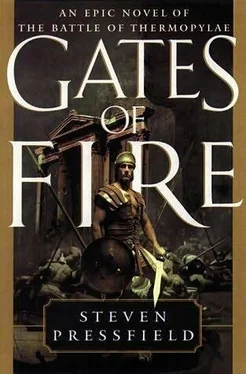Steven Pressfield - Gates of Fire - An Epic Novel of the Battle of Thermopylae
Здесь есть возможность читать онлайн «Steven Pressfield - Gates of Fire - An Epic Novel of the Battle of Thermopylae» весь текст электронной книги совершенно бесплатно (целиком полную версию без сокращений). В некоторых случаях можно слушать аудио, скачать через торрент в формате fb2 и присутствует краткое содержание. Жанр: Историческая проза, на английском языке. Описание произведения, (предисловие) а так же отзывы посетителей доступны на портале библиотеки ЛибКат.
- Название:Gates of Fire: An Epic Novel of the Battle of Thermopylae
- Автор:
- Жанр:
- Год:неизвестен
- ISBN:нет данных
- Рейтинг книги:3 / 5. Голосов: 1
-
Избранное:Добавить в избранное
- Отзывы:
-
Ваша оценка:
- 60
- 1
- 2
- 3
- 4
- 5
Gates of Fire: An Epic Novel of the Battle of Thermopylae: краткое содержание, описание и аннотация
Предлагаем к чтению аннотацию, описание, краткое содержание или предисловие (зависит от того, что написал сам автор книги «Gates of Fire: An Epic Novel of the Battle of Thermopylae»). Если вы не нашли необходимую информацию о книге — напишите в комментариях, мы постараемся отыскать её.
Gates of Fire: An Epic Novel of the Battle of Thermopylae — читать онлайн бесплатно полную книгу (весь текст) целиком
Ниже представлен текст книги, разбитый по страницам. Система сохранения места последней прочитанной страницы, позволяет с удобством читать онлайн бесплатно книгу «Gates of Fire: An Epic Novel of the Battle of Thermopylae», без необходимости каждый раз заново искать на чём Вы остановились. Поставьте закладку, и сможете в любой момент перейти на страницу, на которой закончили чтение.
Интервал:
Закладка:
The spring's gone sulphurous, hasn't it?
It presages the enemy's death, sir, not ours.
You're as full of shit as the priests.
I could see he was all right now.
The allies need your cousin upon this site, he observed, settling in pain upon the earth, to intercede with the goddess on their behalf.
He meant Diomache.
Here, he said. Sit beside me.
This was the first time I had heard my master refer aloud to Diomache, or even acknowledge his awareness of her existence. Though I had never, in our years, presumed to burden him with details of my own history prior to entering his service, I knew he knew it all, through Alexandros and the lady Arete.
This is a goddess I have always felt pity for-Persephone, my master declared. Six months of the year she rules as Hades' bride, mistress of the underworld. Yet hers is a reign bereft of joy.
She sits her throne as a prisoner, carried off for her beauty by the lord of hell, who releases his queen under Zeus' compulsion for half the year only, when she comes back to us, bringing spring and the rebirth of the land. Have you looked closely at statues of her, Xeo? She appears grave, even in the midst of the harvest's joy. Does she, like us, recall the terms of her sentence-to retire again untimely beneath the earth? This is the sorrow of Persephone. Alone among the immortals the Kore is bound by necessity to shuttle from death to life and back again, intimate of both faces of the coin. No wonder this fount whose twin sources are heaven and hell is sacred to her.
I had settled now upon the ground beside my master. He regarded me gravely.
It's too late, don't you think, he pronounced, for you and I to keep secrets from one another?
I agreed the hour was far advanced.
Yet you preserve one from me.
He would have me speak of Athens, I could see, and the evening barely a month previous wherein I had at last- through his intercession-met again my cousin.
Why didn't you run? Dienekes asked me. I wanted you to, you know.
I tried. She wouldn't let me.
I knew my master would not compel me to speak. He would never presume to tread where his presence sowed distress. Yet instinct told me the hour to break silence had come. At worst my report would divert his preoccupation from the day's horror and at best turn it, perhaps, to more propitious imaginings.
Shall I tell you of that night in Athens, sir?
Only if you wish.
It was upon an embassy, I reminded him. He, Polynikes and Aristodemos had traveled on foot from Sparta then, without escort, accompanied only by their squires. The party had covered the distance of 140 miles in four days and remained there in the city of the Athenians for four more, at the home of the proxenos Kleinias the son of Alkibiades. The object of the legation was to finalize the eleventh-hour details of coordinating land and sea forces at Thermopylae and Artemisium: times of arrival for army and fleet, modes of dispatch between them, courier encryptions, passwords and the like. Unspoken but no less significant, Spartans and Athenians wished to look each other in the eye one last time, to make sure both forces would be there, in their places, at the appointed hour.
On the evening of the third day, a salon was held in honor of the embassy at the home of Xanthippus, a prominent Athenian. I loved to listen at these affairs, where debate and discourse were always spirited and often brilliant. To my great disappointment, my master summoned me alone before table and informed me of an urgent errand I must run. Sorry, he said, you'll miss the party. He placed into my hands a sealed letter, with instructions to deliver it in person to a certain residence in the seaport town of Phaleron. A boy servant of the house awaited without, to serve as guide through the nighttime streets. No particulars were given beyond the addressee's name. I assumed the communication to be a naval dispatch of some urgency and so traveled armed.
It took the time of an entire watch to traverse that labyrinth of quarters and precincts which comprises the city of the Athenians. Everywhere men-at-arms, sailors and marines were mobilizing; chandlery waggons rumbled under armed escorts, bearing the rations and supplies of the fleet. The squadrons under Themistokles were readying for embarkation to Skiathos and Artemisium. Simultaneously families by the hundreds were crating their valuables and fleeing the city. As numerous as were the warcraft moored in lines across the harbor, their ranks were eclipsed by the ragtag fleet of merchantmen, ferries, fishing smacks, pleasure boats and excursion craft evacuating the citizenry to Troezen and Salamis. Some of the families were fleeing for points as distant as Italia, As the boy and I approached Phaleron port, so many torches filled the streets that the passage was lit bright as noon.
Lanes became crookeder as we approached the harbor. The stink of low tide choked one's nostrils; gutters ran with filth, backed up into a malodorous stew of fish guts, leek shavings and garlic. I never saw so many cats in my life. Grogshops and houses of ill fame lined streets so narrow that daylight's cleansing beams, I was certain, never penetrated to the floors of their canyons to dry the slime and muck of the night's commerce in depravity. The whores called out boldly as the boy and I passed, advertising their wares in coarse but good-humored tongue. The man to whom we were to deliver the letter was named Terrentaius. I asked the lad if he had any idea who the fellow was or what station he held. He said he had been given the house name alone and nothing more.
At last the boy and I located it, an apartment structure of three stories called the Griddle after the slop shop and inn which occupied its street-level floor. I inquired within for the man Terrentaius.
He was absent, the publican declared, with the fleet. I asked after the man's ship. Which vessel was he officer of? A round of hilarity greeted this query. He's a lieutenant of the ash, one of the tippling seamen declared, meaning the only thing he commanded was the oar he pulled. Further inquiries failed to elicit any additional intelligence. Then, sir, the boy guide addressed me, we are instructed to deliver the letter to his wife.
I rejected this as nonsense.
No, sir, replied the lad with conviction, I have it from your master himself. We are to place the letter in the hands of the man's mistress, by name Diomache.
With but a moment's consideration I perceived in this event the hand, not to say the long arm, of the lady Arete. How had she tracked down and located, from the remove of Lakedaemon, this house and this woman? There must be a hundred Diomaches in a city the size of Athens. No doubt the lady Arete had maintained her intentions secret, anticipating that I, made aware of them in advance, would have found excuse to evade their obligation. In this, she was doubtless correct.
In any event my cousin, it was discovered, was not present in the apartments, nor could any of the seamen inform us as to her whereabouts. My guide, a lad of resourcefulness, simply stepped into the alley and bellowed her name. In moments the grizzled heads of half a dozen backstreet dames appeared above, among the hanging laundry of the lane-facing windows. The name and site of a harbor-town temple were shouted down to us.
She'll be there, boy. Just follow the shore.
My guide set out again in the lead. We traversed more stinking sea-town streets, more alleys choked with traffic of the natives clearing out. The boy informed me that many of the temples in this quarter functioned less as sanctuaries of the gods and more as asylums for the cast-out and the penniless, particularly, he said, wives put by by their husbands. Meaning those deemed unfit, unwilling, or even insane. The boy pressed ahead in merry spirits. It was all a grand adventure to him.
Читать дальшеИнтервал:
Закладка:
Похожие книги на «Gates of Fire: An Epic Novel of the Battle of Thermopylae»
Представляем Вашему вниманию похожие книги на «Gates of Fire: An Epic Novel of the Battle of Thermopylae» списком для выбора. Мы отобрали схожую по названию и смыслу литературу в надежде предоставить читателям больше вариантов отыскать новые, интересные, ещё непрочитанные произведения.
Обсуждение, отзывы о книге «Gates of Fire: An Epic Novel of the Battle of Thermopylae» и просто собственные мнения читателей. Оставьте ваши комментарии, напишите, что Вы думаете о произведении, его смысле или главных героях. Укажите что конкретно понравилось, а что нет, и почему Вы так считаете.












